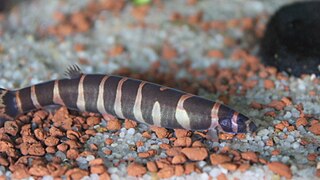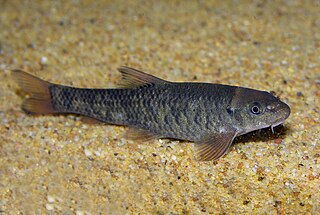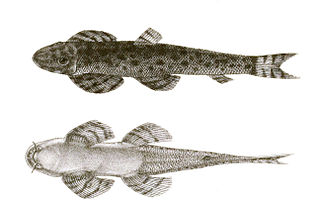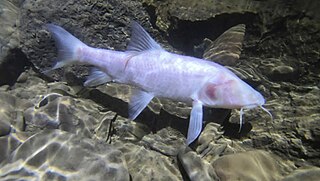
Tor is a genus of cyprinid fish commonly known as mahseers.

Mahseer is the common name used for the genera Tor, Neolissochilus, Naziritor and Parator in the family Cyprinidae (carps). The name is, however, more often restricted to members of the genus Tor. The range of these fish is from Vietnam in the east and China in the north, through Laos, Cambodia, Thailand, Malaysia, Brunei and Indonesia, and across southern Asia including the countries of India, Nepal, Bhutan and Bangladesh within the Indian Peninsula, plus Sri Lanka, Pakistan and Afghanistan. They are commercially important game fish, as well as highly esteemed food fish. Mahseer fetch high market price, and are potential candidate species for aquaculture. Several of the larger species have suffered severe declines, and are now considered threatened due to pollution, habitat loss, overfishing and increasing concern about the impacts of unregulated release of artificially bred stock of a very limited number of species.

Acrossocheilus is a genus of ray-finned fishes in the family Cyprinidae, native to freshwater in China, Taiwan, Laos, and Vietnam. They are fairly small, no more than 30 cm (1 ft) in standard length.

Puntius is a genus of small freshwater fish in the family Cyprinidae native to South Asia and Mainland Southeast Asia, as well as Taiwan.

Pangio is a genus of small Asian freshwater fish in the true loach family Cobitidae. In earlier taxonomic schemes it was known as Acanthophthalmus. The "kuhli loach" is well-known in the aquarium trade and commonly identified as P. kuhlii, but most individuals actually appear to be P. semicincta.

Rasbora is a genus of fish in the family Cyprinidae. They are native to freshwater habitats in South and Southeast Asia, as well as southeast China. A single species, R. gerlachi, is only known from an old specimen that reputedly originated from Africa (Cameroon), but this locality is considered doubtful. They are small, up to 17 cm (6.7 in) long, although most species do not surpass 10 cm (4 in) and many have a dark horizontal stripe.
Sinocyclocheilus is a genus of freshwater fish in the family Cyprinidae that is endemic to Guangxi, Guizhou and Yunnan in China. Almost all of its species live in or around caves and most of these have adaptions typical of cavefish such as a lack of scales, lack of pigmentation and reduced eyes. Several species have an unusual hunchbacked appearance and some of the cave-dwellers have a "horn" on the back, the function of which is unclear. In contrast, the Sinocyclocheilus species that live aboveground, as well as a few found underground, show no clear cavefish adaptions. They are relatively small fish reaching up to 23 cm (9.1 in) in length. The individual species have small ranges and populations, leading to the status of most of the evaluated species as threatened. Many species populations in the genus have yet to be evaluated by the IUCN.

Garra is a genus of fish in the family Cyprinidae. These fish are one example of the "log suckers", sucker-mouthed barbs and other cyprinids commonly kept in aquaria to keep down algae. The doctor fish of Anatolia and the Middle East belongs in this genus. The majority of the more than 160 species of garras are native to Asia, but about one-fifth of the species are from Africa.

Cavefish or cave fish is a generic term for fresh and brackish water fish adapted to life in caves and other underground habitats. Related terms are subterranean fish, troglomorphic fish, troglobitic fish, stygobitic fish, phreatic fish, and hypogean fish.

Balitora is a genus of fish in the family Balitoridae endemic to Asia.

Hypselobarbus carnaticus, also known as the Carnatic carp, is a species of cyprinid fish from the Western Ghats in India where it inhabits riffles and larger pools in rapidly flowing rivers and streams. It prefers to shelter underneath boulders and overhangs. This species can reach a length of 60 centimetres (24 in) TL and has attained a maximum reported weight of 12 kilograms (26 lb). It is a commercially important fish and is also farmed.

Hypselobarbus is a genus of fish in the family Cyprinidae endemic to India.

Pethia is a genus of small freshwater fish in the family Cyprinidae native to South Asia, East Asia and Mainland Southeast Asia. Some species are commonly seen in the aquarium trade. The name Pethia is derived from the Sinhalese "pethia", a generic word used to describe any of several small species of cyprinid fishes. Most members of this genus were included in Puntius, until it was revised in 2012.
Tor sinensis, the Chinese or Red mahseer is a species of mahseer native to the Mekong River. It is known with certainty only from Yunnan, China; reports from Cambodia, Laos, and Thailand require confirmation.
It is one of four currently valid species described from China, the others being Tor laterivittatus, Tor polylepis, and Tor yingjiangensis.

The humpback mahseer is a species of freshwater ray-finned fish from the Indian endemic genus Hypselobarbus in the carp and minnow family Cyprinidae.
Neolissochilus acutirostris is a species of cyprinid in the genus Neolissochilus. It inhabits India and has a maximum length of 22.6 centimetres (8.9 in).
Neolissochilus micropthalmus is a species of cyprinid in the genus Neolissochilus. It inhabits India and has a maximum length of 17.3 centimetres (6.8 in).
Neolissochilus minimus is a species of cyprinid fish in the genus Neolissochilus. It inhabits the Western Ghats of India and has a maximum length of 12.9 centimetres (5.1 in).

Tor malabaricus, the Malabar mahseer, is a fish, a species of mahseer native to southwestern India.

Neolissochilus pnar is a species of subterranean cyprinid in the genus Neolissochilus. It is the largest known subterranean fish, a title formerly held by the blind cave eel.













